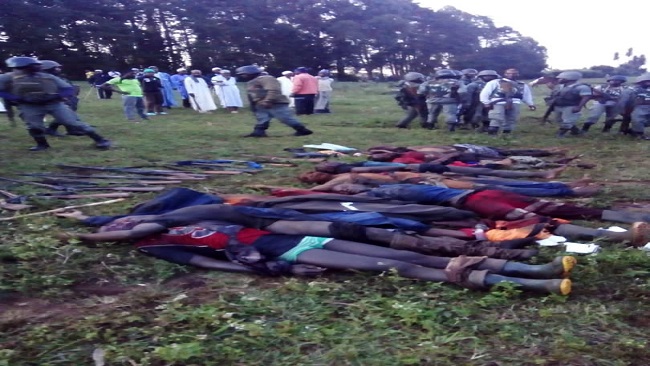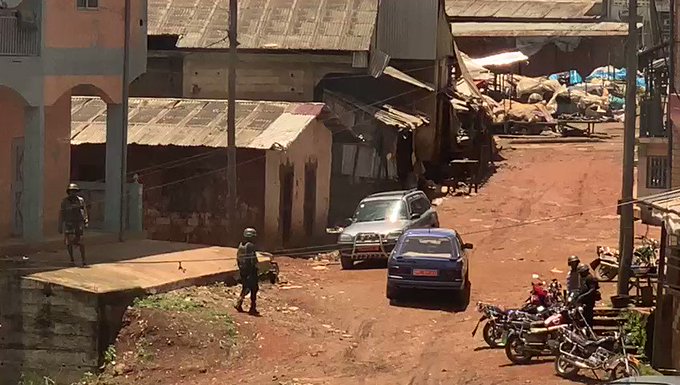16, May 2019
UN chief concerned nuclear ‘coffin’ leaking in Pacific 0
UN Secretary General Antonio Guterres raised concerns Thursday that a concrete dome built last century to contain waste from atomic bomb tests is leaking radioactive material into the Pacific.
Speaking to students in Fiji, Guterres described the structure on Enewetak atoll in the Marshall Islands as “a kind of coffin” and said it was a legacy of Cold War-era nuclear tests in the Pacific
“The Pacific was victimised in the past as we all know,” he said, referring to nuclear explosions carried out by the United States and France in the region.
In the Marshalls, numerous islanders were forcibly evacuated from ancestral lands and resettled, while thousands more were exposed to radioactive fallout.
The island nation was ground zero for 67 American nuclear weapons tests from 1946-58 at Bikini and Enewetak atolls, when it was under US administration.
The tests included the 1954 “Bravo” hydrogen bomb, the most powerful ever detonated by the United States, about 1,000 times bigger than the atomic bomb dropped on Hiroshima.
Guterres, who is touring the South Pacific to raise awareness of climate change issues, said Pacific islanders still needed help to deal with the fallout of the nuclear testing.
“The consequences of these have been quite dramatic, in relation to health, in relation to the poisoning of waters in some areas,” he said.
“I’ve just been with the President of the Marshall Islands (Hilda Heine), who is very worried because there is a risk of leaking of radioactive materials that are contained in a kind of coffin in the area.”
The “coffin” is a concrete dome, built in the late 1970s on Runit island, part of Enewetak atoll, as a dumping ground for waste from the nuclear tests.
Radioactive soil and ash from the explosions was tipped into a crater and capped with a concrete dome 45 centimetres (18 inches) thick.
However, it was only envisaged as a temporary fix and the bottom of the crater was never lined leading to fears the waste is leaching into the Pacific.
Cracks have also developed in the concrete after decades of exposure and there are concerns it could break apart if hit by a tropical cyclone.
Guterres did not directly address what should be done with the dome but said the Pacific’s nuclear history still needed to be addressed.
“A lot needs to be done in relation to the explosions that took place in French Polynesia and the Marshall Islands,” he said.
“This is in relation to the health consequences, the impact on communities and other aspects.
“Of course there are questions of compensation and mechanisms to allow these impacts to be minimised.”
AFP































17, May 2019
UN urges support for displaced Southern Cameroonians in Nigeria 0
UNHCR has called for urgent support for Cameroon’s displaced as violence in the north and south-west regions continues to force thousands to flee.
Violent clashes between Cameroon’s military and armed separatists have displaced some 437,000 within the country’s borders and forced about 35,000 like Agah to seek safety in Nigeria. The displaced, the majority of whom are women and children, are mostly from English-speaking areas. They face great hardship in both countries.
Having fled with very little, their presence in already impoverished host communities is straining food resources and already limited health, education, water and sanitation facilities in these areas.
UNHCR has launched an urgent appeal to increase support for displaced Cameroonians who have survived nearly two years of ongoing violence. But of the US$184 million required for UNHCR’s operations in Cameroon and Nigeria – including US$35.4 million needed urgently for critical life-saving assistance to newly displaced Cameroonians – just four per cent has been raised.
One of three refugee sites hosting Cameroonian refugees has doubled its capacity of 4,000 and currently hosts more than 7,000 refugees. The numbers have further increased as many refugees who previously lived in the host communities have relocated to the settlements since November.
UNHCR is working closely with the Nigerian government to register all new arrivals and provide basic assistance. This includes the harder to reach refugee population living in the host communities in over 47 villages along the border, who make up over 60 per cent of the refugee population.
Source: TVcnews